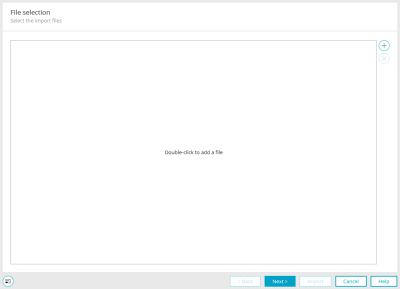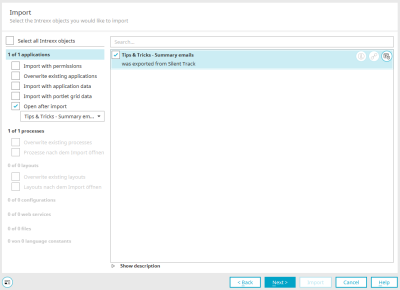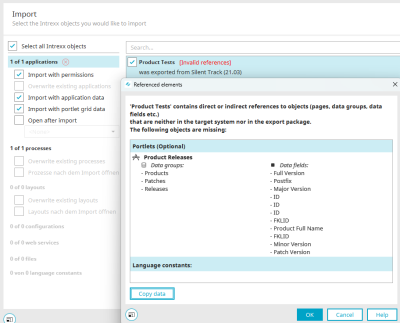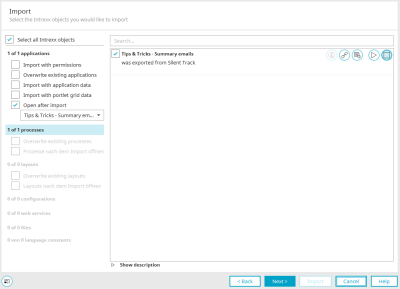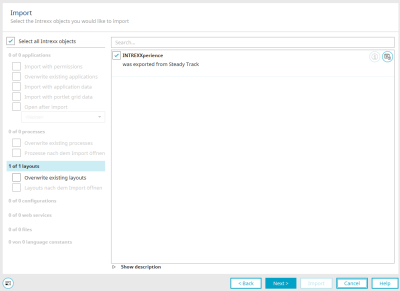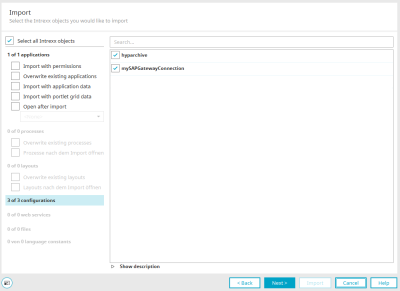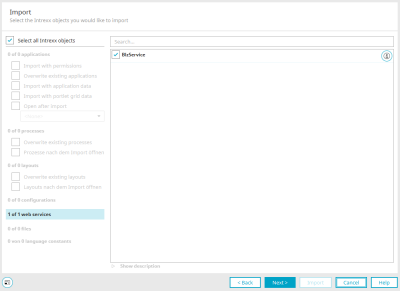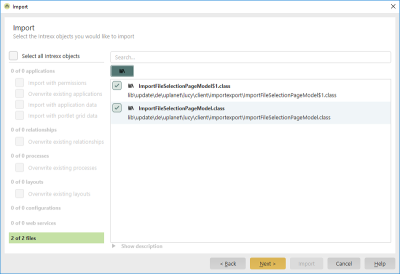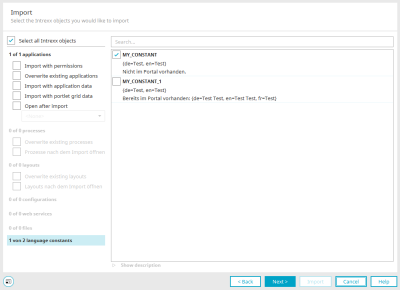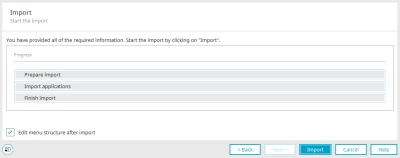Import applications, processes, layouts, configurations, web services and language constants
If you are in the "Applications", " Processes" or "Layouts" module, you can access the import wizard via the main menu "File / [Import object]".
Select import file
Select the desired import file here by clicking on ![]() "Add file". Selected import files are then listed. Select the corresponding checkbox to the left of the name of the import object if you want to import it.
"Add file". Selected import files are then listed. Select the corresponding checkbox to the left of the name of the import object if you want to import it.
![]() Remove file
Remove file
Removes the import file currently selected in the list from the list.
Objects of the same type (e.g. application, process) from different import file packages cannot be imported at the same time. For example, applications from package 1 and package 2 cannot be imported at the same time, but applications from package 1 and processes from package 2 can be imported at the same time.
Important:
Only zip files that do not contain any other zip files are accepted.
Example of a valid ZIP file:
-
Example.zip
-
apps.lax
-
processes.ixpr
-
Example of an invalid ZIP file:
-
Invalid.zip
-
another.zip
-
apps.lax
-
processes.ixpr
-
-
Click "Next".
Import - Overview
Select all import objects
Selects all objects in a category.
Search
A search term can be entered here. The list of import objects is then filtered by this term within the selected category.
Categories
You will find the following categories on the left of the dialog:
-
Applications
-
Processes
-
Layouts
-
Configurations
-
Files
-
Language constants
If you select a category, all importable objects of this type are listed to the right of it. Select the checkbox if you want to import the corresponding object. The number of objects in the category selected for import is then automatically displayed for the category on the left-hand side. Click on "Show description" to display a text field below the object list on the right-hand side, in which the descriptions of the import objects are displayed for all categories (except web services).
Applications
Import with rights
With this setting, all rights that are set in the application properties are transferred to the export.
Overwrite existing applications
If an application with the same GUID exists in the portal, it will be overwritten with the import application. Please note that data may be lost, e.g. if a data field exists in the existing application but is no longer contained in the import application.
If you activate the overwriting of existing applications during import, associated processes should also be imported with the setting "Overwrite existing processes".
Import with application data
All data entered in the application is transferred during import.
Import data with Portletgrid
With this setting, the grids are imported from all portlet containers contained in the application.
Open after import
Displays a selection list with all applications from the import package. The application selected there is opened directly in the "Applications" module after the import.
![]() Version information
Version information
Opens a dialog in which information on the version number is displayed.
![]() Referenced elements
Referenced elements
Opens a dialog in which objects that are linked to the import object can be selected for import.
![]() Version management
Version management
Opens a dialog in which information about the entries in the history is displayed.
Invalid references
If you import an application, a process or a layout with invalid references, a link highlighted in red is displayed next to the affected import object. Clicking on it opens a dialog box from which you can see the relevant details.
This dialog displays the missing objects that are required to import the selected package.
Copy files
By clicking on "Copy data", the GUIDs and names of the objects can either be copied to the clipboard or saved in a text file.
Processes
Overwrite existing processes
If a process with the same GUID exists in the portal, it is overwritten with the import process.
![]() Version information
Version information
Opens a dialog in which information on the version number is displayed.
![]() Referenced elements
Referenced elements
Opens a dialog in which objects that are linked to the import object can be selected for import.
![]() Version management
Version management
Opens a dialog in which information about the entries in the history is displayed.
![]() Activate during import
Activate during import
The process is activated during import.
![]() Deactivate during import
Deactivate during import
The process is transferred to the portal as deactivated.
Layouts
Overwrite existing processes
If a layout with the same GUID exists in the portal, it will be overwritten with the import layout.
![]() Version information
Version information
Opens a dialog in which information on the version number is displayed.
![]() Version management
Version management
Opens a dialog in which information about the entries in the history is displayed.
Configurations
Connections to external data sources can be selected for import here.
Web services
![]() Information on the web service
Information on the web service
Opens a dialog in which information about the web service is displayed.
Files
Configuration files and libraries can be selected for import here.
![]() Show/hide libraries
Show/hide libraries
Shows or hides the libraries, respectively.
Language constants
If global language constants are integrated in an application that are not available in the target portal, these are listed here and can be selected for import.
Follow-up dialogs
Once you have selected the desired import objects and clicked "Next", the import can usually be started. Contains the selected import objects
or
another dialog is displayed in which you can make the desired settings. The import can then be started.
Start import
Here you will be informed about the progress of the import. You can also access this dialog when exporting applications, processes, layouts, etc.
Edit menu structure after import
With this setting, a dialog is displayed after a successful import in which the application can be arranged in the menu structure. The setting can only be selected if the "Overwrite existing applications" setting was not previously set during import.
